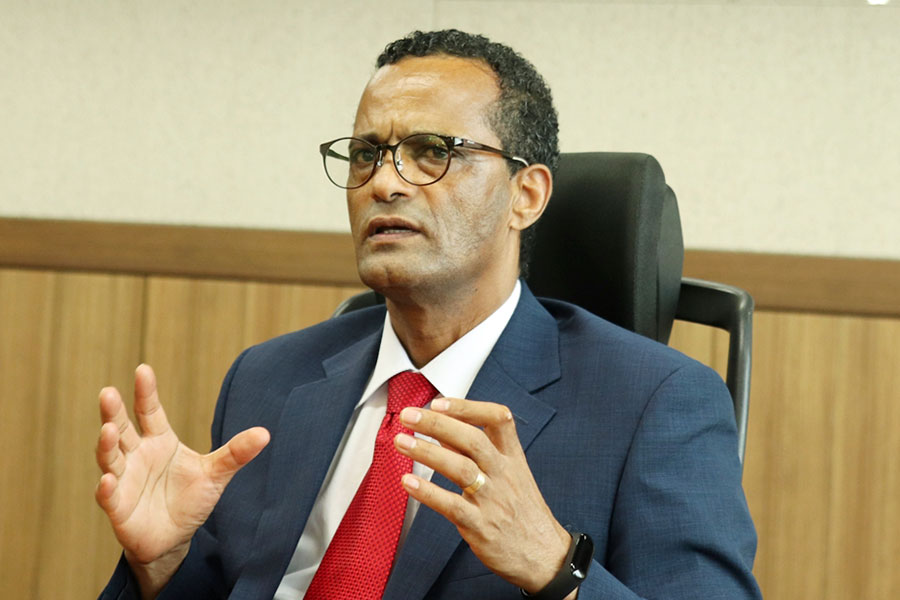
The Civil Registration & Residency Service Agency (CRRSA) has undergone a major overhaul, upgrading its network and digital systems across the city. The new systems aim to resolve longstanding service delays, which have frequently frustrated residents. These improvements are expected to significantly reduce wait times for essential operations, including the issuance of vital certificates and residency verification.
The upgraded systems, installed across 119 woredas, 11 districts, and two branch offices, were developed by Kenera International Technology Plc., a local firm with over 16 years of experience. Kenera has provided the Agency with data solutions, CCTV cameras, and a data centre.
The Agency is among the first public service institutions to implement such an extensive network overhaul. By separating its network infrastructure and introducing full surveillance monitoring at all 132 branches, the Agency has enhanced both digital efficiency and physical security. The upgraded infrastructure includes advanced systems designed to meet rising demand and improve the quality of service.
Yonas Alemayehu, the Agency's Director General, praised the system upgrade as a key milestone in the government's digitisation efforts, making the Agency the first government office equipped with comprehensive surveillance and monitoring capabilities.
“It is a milestone in digitisation,” he said.
The digital improvements include advanced SD-WAN (Software Defined Wide Area Network), LAN (Local Area Network), and DhCI (Disaggregated Hyper-Converged Infrastructure) systems. The SD-WAN technology is designed to monitor network performance in real time and identify service malfunctions. A central dashboard at the Agency's headquarters enables 24-hour surveillance, with hundreds of cameras feeding data into the system’s central server.
These enhancements are expected to improve the efficiency of the Agency’s operations, which include managing vital records and residency information. The Agency issues birth, marriage, divorce, and death certificates, as well as residency verifications and residence IDs.
Aemero Kassa, head of the ICT directorate at the Agency, reflected on the previous system's challenges, which led to long queues and frequent delays. He pointed out that network failures were a constant issue, pushing the Agency to develop its network infrastructure.
"Service efficiency and quality have lagged," Aemero said, expressing confidence that the new system will significantly reduce service times and improve customer satisfaction.
Kenera secured the contract following an international bid jointly floated by the Agency and the Addis Abeba Innovation & Technology Bureau. Aemero highlighted that the company's technical capabilities played a decisive role in its selection, with experience improving data systems for several banks.
Previously, the Agency relied on Woredanet, a shared network used by over 61 city administration offices, including the trade and revenue bureaus. This shared network often resulted in slow service, leading to resident frustration. Aemero acknowledged that residency services have historically been the primary source of complaints.
The Agency has also outsourced the development of an online system to Toppan Gravity, a Japan-based technology firm, with plans to launch the system within a year. Aemero revealed that once completed, all services will be available online. The Agency has already issued digital IDs to 1.6 million residents in the capital and plans to expand door-to-door registration to reach all residents.
Meanwhile, Woredanet is undergoing marked reform under the supervision of the Addis Abeba Innovation & Technology Development Bureau. Ethio Telecom has been tasked with upgrading the city’s network infrastructure through the ‘City Net’ project, which aims to address the system failures and connectivity issues that have plagued public services.
Yemane Desalegn, deputy head of the bureau, acknowledged the frustrations caused by frequent network outages.
“System failure has been a major issue,” Yemane said, adding that the bureau has been working with experts from Addis Abeba University to improve public service delivery.
Woredanet, originally managed by the Ministry of Innovation & Technology, was overhauled in 2019 to deliver faster, more cost-effective services. However, no noteworthy improvements were observed. Yemane disclosed that the bureau is negotiating with the Ministry to take partial control of Woredanet’s administration, which is expected to improve system management.
Public dissatisfaction with government services remains high in a country ranked 179th out of 193 in the e-Government Index. While Ethiopia fared slightly better at 163rd in e-participation, issues of reliability, accessibility, and consistency continue to affect public confidence in government systems.
These frustrations are not uncommon. Berhane Amare, a 22-year-old student, had to visit the Gulele district branch of the Agency multiple times before he could obtain his residency ID. After moving from Borena Zone, Oromia Regional State, to pursue his studies at Admas College, Berhane needed to convert his ID, but system outages during his first two visits left him empty-handed.
"Their service has been tedious," Berhane recalled.
The new services were officially launched last week during a ceremony attended by city officials, including Mayor Adanech Abebie, at the Agency's headquarters near Sheger Park in the Addisu Gebeya area.
Fikirte Zemene, a digital economy researcher at the Policy Studies Institute, attributed many of the issues faced by public service institutions to Ethiopia’s underdeveloped digital ecosystem. She stressed the importance of establishing proper redress mechanisms to facilitate the adoption of new technologies and called for increased government investment in digital infrastructure and data protection laws.
“Proper redress mechanisms play a major role in the adoption of technology,” she said, adding that while the country’s digital transformation is promising, further investment and coordination are essential.
She also noted the need for stronger collaboration among government bodies, noting that duplication of efforts remains a persistent issue.
"Capable IT managers are crucial for its success," Fikirte said.
PUBLISHED ON
Sep 14,2024 [ VOL
25 , NO
1272]

Fortune News | May 26,2021

Radar | May 25,2024

Radar | May 04,2024

Fortune News | Jul 18,2020

Radar | Sep 22,2024

Radar | Feb 24,2024

Fortune News | Jul 30,2022

Fortune News | Jun 11,2022

Fortune News | Sep 22,2024

Editorial | May 16,2020

Dec 22 , 2024 . By TIZITA SHEWAFERAW
Charged with transforming colossal state-owned enterprises into modern and competitiv...

Aug 18 , 2024 . By AKSAH ITALO
Although predictable Yonas Zerihun's job in the ride-hailing service is not immune to...

Jul 28 , 2024 . By TIZITA SHEWAFERAW
Unhabitual, perhaps too many, Samuel Gebreyohannes, 38, used to occasionally enjoy a couple of beers at breakfast. However, he recently swit...

Jul 13 , 2024 . By AKSAH ITALO
Investors who rely on tractors, trucks, and field vehicles for commuting, transporting commodities, and f...

Jun 28 , 2025
Meseret Damtie, the assertive auditor general, has never been shy about naming names...

Jun 21 , 2025
A well-worn adage says, “Budget is not destiny, but it is direction.” Examining t...

Jun 14 , 2025
Yet again, the Horn of Africa is bracing for trouble. A region already frayed by wars...

Jun 7 , 2025
Few promises shine brighter in Addis Abeba than the pledge of a roof for every family...